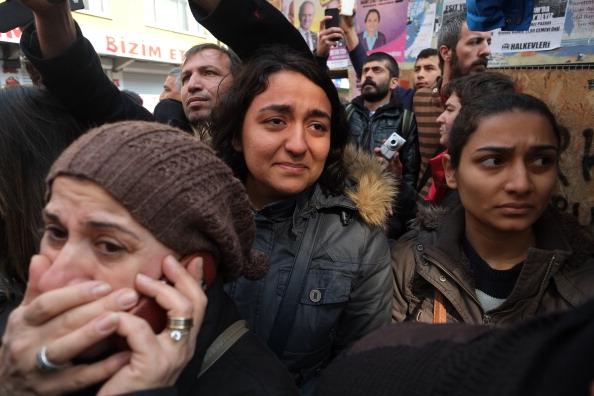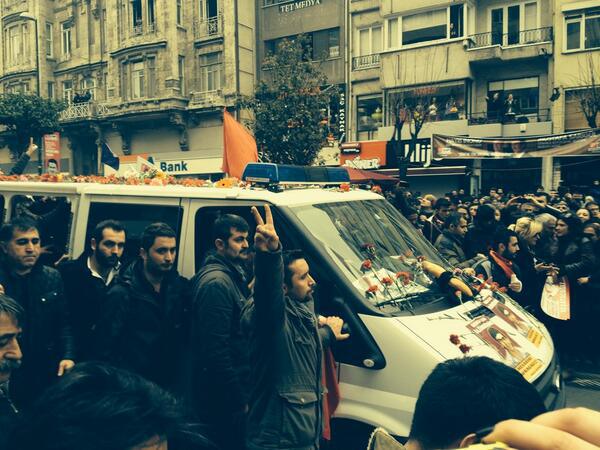
A National Tragedy
Once again, Turkish streets are filled with voices of protest. And once again, those voices are choked with tear gas and buffeted by water cannon. The scenes on television and social media seem terribly similar to those which shocked the world during the Gezi protests this past June.
In fact, the immediate catalyst for these protests is directly tied to the terrible costs of police repression during the Gezi protests.
During the course of the protests, Berkin Elvan, then only fourteen years old, went out to buy some bread for his family. Then, evidence suggests, a police officer fired a gas canister at close range, hitting Berkin in the head. He had been in a coma since June, slowly wasting away. By the time of his death earlier this week, he weighed a little over 35 pounds.
The personal tragedy of his family has become the tragedy of a whole country. Tens of thousands have come out into the streets to mourn him. The great and the good have sent messages of condolence.

Amnesty International – Turkey Country Director, Murat Çekiç, notes:
Nothing can be worse than a child’s death. However, the resistance of the Turkish government and justice system to effectively and thoroughly investigating the killing of a fifteen-year-old boy deepens the pain of his family and of anyone who believes in justice in Turkey. Impunity not only damages trust in the justice system, it is a threat against the future.
A Culture of Impunity
It is not simply that an innocent child was killed by those who are meant to protect him, it is that the Turkish authorities have made no serious attempt to hold those responsible accountable. One of my colleagues noted with bitter irony that, for all the words of sympathy being offered by Turkish politicians this week, they remain silent on the basic issue of justice.
Sadly, this is part of a larger pattern of police abuse and impunity. Amnesty International Turkey Researcher, Andrew Gardner, writes in a blog today:
During the nine months that have passed since Berkin Elvan was hit by a tear gas canister, the Turkish authorities have done very little to end police violence or deliver justice for past abuses.
In failures typical of investigations into police violence in Turkey, the police officers responsible for firing tear gas at Berkin Elvan have not been identified. No CCTV footage of the incident has been found. A single prosecutor was tasked with investigating all the hundreds of complaints into police violence that took place last summer in Istanbul.
Clearly, this is not the kind of effective investigation that millions of people around Turkey and elsewhere have been calling for.
In all of Turkey, only two prosecutions have been brought following last summer’s police violence. And even those came only after tremendous efforts by the families of the victims and public pressure, including from Amnesty International.
If police abuse is rampant in Turkey, it is because the authorities choose to allow it.
)
During the height of the Gezi protests, Prime Minister Tayyip Erdogan praised police action as heroic, while thousands were being injured through police abuse. Yesterday evening, amazingly, his only public comment on the death of Berkin Elvan and the protests that have followed was that they are unlikely to have any long-term repercussions on the economy.
Over the past days, tens of thousands of protesters have poured into Turkey’s streets. The night after news of Berkin’s death was released, protests occurred in at least 31 different cities in Turkey. Confident that they could act with impunity, police abuse was rampant.
The tragedy of Berkin’s death has only highlighted the reality that police abuse in Turkey is seldom investigated, rarely prosecuted, and almost never results in serious punishment. Amnesty’s 2013 report on Turkey notes that “investigations and prosecutions of public officials for alleged human rights violations remained flawed with little prospect of those responsible being brought to justice. Convicted officials frequently received suspended sentences and remained in post.”
A New Crisis
Writing from Istanbul, Andrew Gardner highlights the widespread anger that this culture of impunity has created: “people in Turkey are incensed that taking to the streets as a peaceful demonstrator, or as a bystander, could – and still can – cost you your life at the hands of the police.”
Gardner witnessed police deploying tear gas and water cannon against peaceful protesters only moments after Berkin’s funeral had ended. Social media carries horrifying scenes of police abuse and neighborhoods suffocating in a cloud of tear gas. Already new deaths have been reported:
By morning, two people had died at the scene of demonstrations. One person was shot in Istanbul, in a clash not thought to involve the police. A police officer in the eastern city of Tunceli/Dersim died following a heart attack. Initial reports suggested that large amounts of tear gas used against protesters may have prompted his heart attack. Scores of injuries were reported.
“Every day that passes without justice for Berkin Elvan and countless other victims of police violence will sow further dissent,” writes Gardner. “The government should learn this lesson before it is too late.”
Sadly, it shows little signs of doing so.
